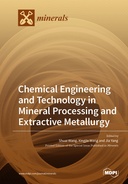Explore

Chemical Engineering and Technology in Mineral Processing and Extractive Metallurgy
0 Ungluers have
Faved this Work
Login to Fave
Chemical engineering and technology are the basis of mineral processing and extractive metallurgy. In the long history of human civilization, with the development of science and technology, chemical engineering, mineral processing, metallurgical engineering, and other process technologies have coexisted and mutually benefited each other. More than 100 years ago, chemical engineers summarized the common laws in the process industry and built up the basic theory of unit operations. It is undoubtedly of great significance to study the chemical engineering principles in mineral processing and extractive metallurgy to profoundly understand the essence of mineral separation and extraction, optimizing the technological flow of mineral processing and improving the utilization level of mineral resources. The purpose of this book is to discuss chemical engineering principles in mineral processing and extractive metallurgy to improve the utilization of mineral resources. Experts, technicians, and students in the fields of chemical engineering, metallurgy, and mineral processing are welcome to read this book.
This book is included in DOAB.
Why read this book? Have your say.
You must be logged in to comment.
Rights Information
Are you the author or publisher of this work? If so, you can claim it as yours by registering as an Unglue.it rights holder.Downloads
This work has been downloaded 88 times via unglue.it ebook links.
- 88 - pdf (CC BY) at Unglue.it.
Keywords
- adsorption
- AFM
- antimony sulfide
- arsenic
- basicity
- blast furnace slag
- bornite
- boron impurities
- calciothermic reduction
- calcium chloride
- calcium roasting
- čas
- cementation
- chalcocite
- chalcopyrite
- Characterization
- Chemical engineering
- chemical vapor deposition
- chloride
- cobalt-rich crusts
- contact angle
- Conversion
- converter dust
- copper smelting dust
- correlation coefficient
- corrosion resistance
- criterion
- crystallization time
- Cu2S
- cuprous xanthate
- CuS
- deep-sea mining
- density functional theory
- dialkyl dithiophosphate
- diesel oil
- differential charge density
- dissolution
- electrochemical advanced oxidation technology
- electrodeposited antimony
- electronic-grade polysilicon
- enriched gold
- extraction
- extractive metallurgy
- flotation
- flow resistance coefficient
- fluidization experiments
- fluidized bed
- FTIR
- hematite
- Hydrometallurgy
- hydrophobicity
- ilmenite
- induced precipitation
- Industrial Chemistry
- Industrial chemistry & manufacturing technologies
- innovative installation
- iron-free Fenton-like reaction
- K-feldspar
- kerosene
- kinetic parameters
- KR desulfurization slag
- leaching efficiency
- Lead
- liquid–solid
- magnesium
- Maintenance
- marine minerals
- Metals
- metastable state
- mineral processing
- molybdenite
- neodymium
- occurrence
- plasma spraying
- polymetallic nodules
- Potassium
- precipitation
- pressure drop
- pyrometallurgy
- Reduction
- regular aggregate
- roasting–leaching
- seafloor massive sulfides
- secondary copper
- selective flotation
- Separation
- sodium metabisulfite
- sphalerite
- sulfuration–volatilization
- Technology, engineering, agriculture
- Technology: general issues
- TiB2 wettable cathode coating
- TiO2
- Titanium
- Titanium alloys
- Vanadium
- Water chemistry
- wettability
- wollastonite
- xanthate
- zeolite
Links
DOI: 10.3390/books978-3-0365-5425-9Editions

